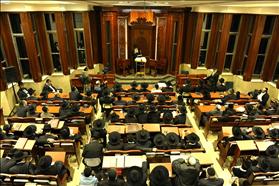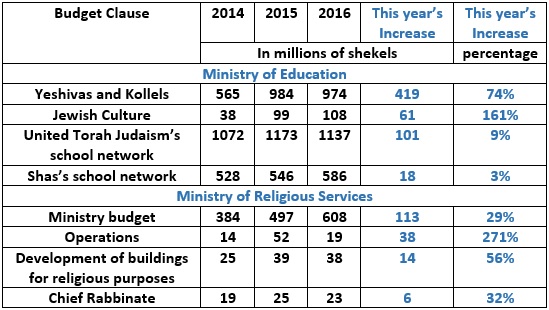700 million additional shekels allocated for religious institutions
Hiddush analysis of Israel’s state budget
The state budget for yeshivas is expected to grow by 419 million shekels, an increase of three-quarters. This is blow to the heart of Israel’s future, and a slap in the voters' faces.
Shahar Ilan 09/09/2015 14:18
Tags: budget · yeshivas · Ministry of Religious Services · Ministry of Education

Students learning at a yeshiva, courtesy: Wikipedia
The state budget for yeshivas is expected to grow by 419 million shekels, an increase of three-quarters. The Ministry of Religious Services will receive a budget increase of almost 30%. The budget for ultra-Orthodox cultural organizations will be increased by more than 2.5 times its current size, and the operating budget for the Religious Services Ministry will be increased by nearly 4 times. Hiddush CEO Rabbi Regev: “This is blow to the heart of Israel’s future, and a slap in the voters' faces.”
The proposed budget for 2015, which passed its first reading in the Knesset last week, includes an increase of 736 million shekels to religious institutions and ultra-Orthodox educational institutions. According to Hiddush’s analysis, the budget for yeshivas is expected to grow by 419 million, representing a 74% increase. The Religious Services Ministry’s budget will increase by 113 million, by almost 30%.
This budget will strand yeshiva students outside the labor market by state funded schools without curricula for English and Mathematics, raising further generations of children who will have tremendous difficulty finding gainful employment should they seek it.
Particularly dramatic leaps were recorded in two clauses of the Budget Law. The budget for Jewish culture will be increased by more than 2.5 times its current levels, from 38 million to 99 million. These monies are mainly used to inject government funds into organizations affiliated with the ultra-Orthodox parties and Jewish proselytizing programs. The operating budget for the Religious Services Ministry will be increased by nearly 4 times, from 14 million to 52 million.
Head of Hiddush Rabbi Uri Regev responded, “presenting the budget very shortly before the Knesset vote and expediting the discussion is intended to conceal the clearance sale of religion and state matters conducted by the Coalition for the ultra-Orthodox. This surrender to the ultra-Orthodox parties’ blackmail directly sabotages Israel’s political and economic future and is a direct slap in the face to the voters.”

Regev stressed that “transferring millions of shekels today to yeshivas, ultra-Orthodox schools that refuse to implement the core curriculum, and Jewish proselytizing organizations gravely threatens Israel’s economic future to the tune of billions of shekels. This budget will strand yeshiva students outside the labor market by state funded schools without curricula for English and Mathematics, raising further generations of children who will have tremendous difficulty finding gainful employment should they seek it.” Regev also noted, “These clauses also transform Israel’s budget into an anti-social initiative. They will mire the Haredi population in poverty and will increase its dependence on welfare benefits, subsidies, handouts and the ultra-Orthodox parties. It is well known that the great expertise of the United Torah Judaism and Shas parties,” he added, “is to create generations of impoverished voters.”
Ministry of Education – United Torah Judaism’s education network budget will increase by 101 million
- The budget for yeshivas will increase from 565 million shekels in 2014 to 984 this year, an increase of 74%. It should be noted that if the income support benefit is reinstated for yeshiva students, as demanded by the ultra-Orthodox parties, this amount is expected to increase by another 130 million shekels. This further increase would nearly double the budget.
- The Jewish culture budget, which is used largely to support the ultra-Orthodox parties’ favored institutions and Jewish proselytizing organizations, will grow by 161% this year, from 38 million to 99 million. In 2016 it will increase to 108 million, an addition of 184% compared to 2014.
- The United Torah Judaism party’s school network’s budget will increase by 101 million shekels, from 1072 million last year to 1173 million this year, representing an increase of 9%. In 2016, there will be a slight decline to 1137 million, but given the fragile state of the coalition, this may never come to pass.
- The Shas party’s school network’s budget will increase by only 18 million shekels this year, from 528 million to 546 million. The greater increase is expected in 2016 to 586 million, an additional 10% above the 2014 budget. These budget increases are expected, despite a scathing Finance Ministry report, accusing Shas’ school network of irregularities and corruption.
In its explanatory notes on the budget, the Ministry of Education remarked that the additional 985 million shekels “actualize the coalition’s budget in accordance to the government’s decision on the matter.”
Religious Services Ministry - an increase of almost 30%
- The Religious Services Ministry budget is expected to grow this year by 113 million shekels, from 384 million in 2014 to 497 million, representing an increase of almost 30%. In 2016 a further increase is expected to 608 million, but this is due to the transfer of the rabbinical courts from the Ministry of Justice to the Ministry of Religious Services.
- Particularly puzzling is the nearly 4x increase expected in the Ministry’s operating budget from 14 million to 52 million.
- The Chief Rabbinate’s will increase from 19 million to 25 million shekels, an additional 32%.
- Another substantial budget increase is intended for the development of buildings for religious purposes, up from 25 million to 39 million shekels, an increase of 56%. The actual increase in the field of building development for religious purposes is even greater than that. The explanatory notes to the budget by the Ministry of Religious Services explain that the 2015-2016 budget is in accordance with the coalition agreements, and 100 million shekels are expected to be allocated to support the construction and renovation of religious buildings. This means that the actual increase is 50 million shekels per year, and much of that money does not appear in this year’s budget because the monies will be drawn from future budgets.